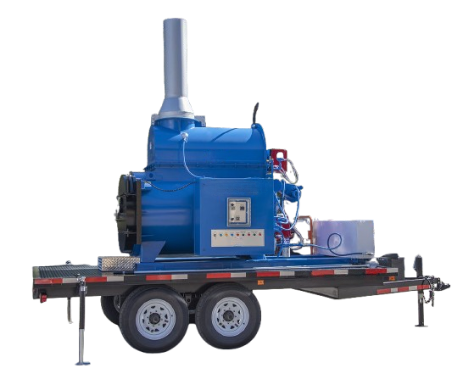Scientific labs are at the forefront of cutting edge research, where precise and reliable equipment is crucial for experiments. However, the waste generated in these labs whether chemical, biological, or hazardous poses significant challenges in terms of management and disposal. With the rising concerns about environmental sustainability and the stringent regulations on waste disposal, laboratories must adopt effective, efficient, and environmentally friendly methods of handling waste. One such innovation is the mobile waste incinerator, a versatile and efficient solution for managing waste in scientific labs.
The Role of Waste Management in Scientific Labs
In a scientific lab, waste management goes beyond just cleaning up after experiments. Improper waste disposal can lead to contamination, accidents, and environmental harm. Many labs generate hazardous waste, including chemical solvents, biological materials, and other toxic substances. These need to be disposed of following stringent guidelines to prevent harm to the environment and public health.
Moreover, the disposal of waste in a timely and secure manner is necessary to ensure that the lab space remains safe for continued research. Inefficient waste management can disrupt research workflows, create health risks, and even result in legal consequences due to non compliance with local and international waste disposal regulations.
Mobile Waste Incinerators: A Cutting Edge Solution
A mobile waste incinerator is a self contained, portable unit designed to burn waste materials at high temperatures, reducing them to ash, gas, and heat. The compact design and mobility make these incinerators an excellent option for scientific labs, offering numerous benefits over traditional waste disposal methods. These systems can handle a variety of waste types, including hazardous chemicals, biological waste, plastics, and other lab generated materials, making them adaptable to the diverse waste streams found in laboratories.
Efficient Waste Processing
One of the primary advantages of using a mobile waste incinerator in scientific labs is the efficiency with which it handles waste. Traditional waste disposal methods such as landfilling or off site incineration often require long wait times and expensive logistics. In contrast, a mobile incinerator offers immediate processing at the lab site, reducing delays and preventing the accumulation of hazardous waste. The compact design means that it can be positioned close to the source of waste generation, improving turnaround times and reducing the need for transportation.
Cost Effectiveness
Using a mobile waste incinerator can significantly reduce costs associated with waste management in scientific labs. By eliminating the need for off site disposal services, transportation costs are minimized. Additionally, many mobile incinerators operate on site, reducing the need for storage and handling of hazardous waste, which can also lead to savings in both time and money.
Flexibility and Mobility
Scientific labs are dynamic environments, often moving from one project to another or relocating to different facilities. The mobility of a mobile waste incinerator allows labs to manage their waste efficiently regardless of their location. Labs do not need to invest in stationary waste management systems that are tied to a fixed location. A mobile incinerator can be deployed wherever necessary, ensuring that waste is properly managed without the constraints of infrastructure or space limitations.
Environmental and Safety Considerations
Mobile waste incinerators are designed to meet strict environmental regulations. These incinerators burn waste at high temperatures, ensuring complete combustion, which minimizes harmful emissions. Many models are equipped with advanced filtration systems to capture gases and particulate matter, reducing the environmental impact of waste incineration.
Furthermore, mobile incinerators contribute to enhanced safety in scientific labs by reducing the handling of hazardous waste. Instead of storing potentially dangerous waste for extended periods, labs can safely and efficiently dispose of it on site, decreasing the risks associated with long term waste storage and handling.
Conclusion
In conclusion, mobile waste incinerators offer significant advantages for improving waste management in scientific labs. Their efficiency, cost effectiveness, flexibility, and environmental safety make them an ideal choice for laboratories dealing with hazardous and diverse waste streams. By utilizing these incinerators, labs can streamline their waste disposal processes, ensuring both regulatory compliance and safety while supporting sustainable research practices.
Related Reads
- Top Technical Interview Services to Hire Skilled Talent
- The Mental and Physical Health Benefits of Green Exercise
- Watch Free Movies and TV Shows Online in HD at Gomovies
- How to Select the Best Permanent Eyeliner Specialist in Avon Lake and North Olmsted
- Bridging Global Connections with LinguaShine: A Leading Translation Company



